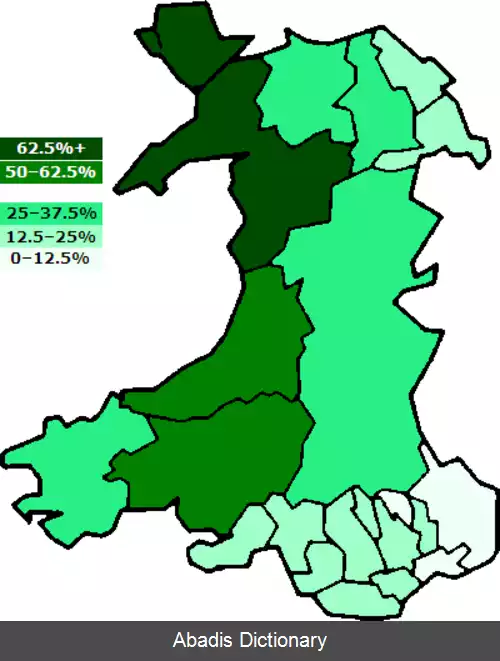زبان ولزی ( به ولزی: Cymraeg - انگلیسی: Welsh ) یک زبان باستانی سلتی است که مردمان ولز در بریتانیا از آن استفاده می کنند. این زبان هم اکنون زبان اول ۲۰٪ مردم ولز است و توسط تعداد بیشتری از ساکنان منطقه فهمیده می شود. بیشتر مردم این منطقه انگلیسی نیز می دانند.
... [مشاهده متن کامل]
[نهفتن]
ن • ب • و
زبان های سلتی
سلتیک قاره ای
سلتیبری • گالاسیایی • گالائیک • گالیش • لپونتی • نوریک
سلتیک جزیره ای
بریتونی برتون • بریتانیایی • کورنی • ولزی
گائلیک ایرلندی • مانکس • گالیک اسکاتلندی
نامسلم پیکتی
زبان های آمیخته با سلتیک
بیورلا ریکرت • بانگی • شلتا
پهنه های سلتی زبان
گلتاخت • کئلتاخک • ا ورو گمرائگ • بریتانی پایین • جزیره کیپ برتون • ا ولادفا
آموزش
آموزش متوسطه ایرلندی • آموزش متوسطه گالیک در اسکاتلند • آموزش متوسطه مانکس • آموزش متوسطه ولزی • آموزش متوسطه برتون
نوشته های ایتالیک نشانگر زبان های مرده هستند.
این یک نوشتار خُرد پیرامون زبان و زبان شناسی است. با گسترش آن به ویکی پدیا کمک کنید.
رده های صفحه: زبان های سلتی زبان ها ولز
قس عربی
الوِیلزیة ( Cymraeg کَمْرایگ ) هی لغة کلتیة من الفرع البریطونی، ویتکلمها بعض أهل بلاد ویلز فی غرب بریطانیا وبعض أهل وادی تشوبوت فی منطقة باتاغونیا فی الأرجنتین کلغة أٌم. هناک أیضا ناطقون بها فی إنجلترا والولایات المتحدة وأسترالیا وبلدان أخرى. الویلزیة والإنجلیزیة هما اللغتان الرسمیتان فی ویلز.
[عدل]مقالات ذات صلة
آبریستویث.
ابحث عن وَیلْزِیَّة فی
ویکاموس، القاموس الحر.
تصنیفات: لغة ویلزیةلغات المملکة المتحدةثقافة ویلز
قس ترکی استانبولی
Galce, Hint - Avrupa dil ailesinin Kelt koluna ait dildir. Birleşik Krallık'a bağlı Galler'in resmî dili.
Hint - Avrupa dilleri ile ilgili bu madde bir taslaktır. Maddenin içeriğini geliştirerek Vikipedi'ye katkıda bulunabilirsiniz.
Kategoriler: Hint - Avrupa dilleri taslaklarıDoğal dillerKelt dilleriİrlanda'daki dillerBirleşik Krallık'taki dillerGaller
قس انگلیسی
Welsh ( Cymraeg or y Gymraeg, pronounced [kəmˈrɑːɨɡ, ə ɡəmˈrɑːɨɡ] ) is a member of the Brythonic branch of the Celtic languages spoken natively in Wales, by some along the Welsh border in England, and in Y Wladfa ( the Welsh colony in Chubut Province, Argentina ) . [7] Historically, it has also been known in English as "Cambrian", [8] "Cambric"[9] and "Cymric". [10]
The Welsh Language Board indicated in 2004 that 611, 000 people ( 21. 7% of the population of Wales living in a household ) [11] were able to speak the language. This figure marks a 0. 9 percentage point increase when compared with a figure of 20. 8% from the 2001 census, and an increase of approximately 35, 000 in absolute numbers within Wales. [1] Of those 611, 000 Welsh speakers, 57% ( 315, 000 ) considered themselves fluent, and 78% ( 477, 000 ) consider themselves fluent or "fair" speakers. 62% of speakers ( 340, 000 ) claimed to speak the language daily, including 88% of fluent speakers. [1]
A greeting in Welsh is one of 55 languages included on the Voyager Golden Record chosen to be representative of Earth in NASA's Voyager program launched in 1977. [12] The greetings are unique to each language, with the Welsh greeting being Iechyd da i chwi yn awr ac yn oesoedd which translates into English as "Good health to you now and forever". [13]
The Welsh Language Measure 2011 gives the Welsh language official status in Wales. [14]
Contents [show]
[edit]History
Main article: History of the Welsh language
Welsh emerged in the 6th century from British, the common ancestor of Welsh, Breton, Cornish, and the extinct language known as Cumbric.
Like most languages, there are identifiable periods within the history of Welsh, although the boundaries between these are often indistinct.
The name Welsh originated as an exonym given to its speakers by the Anglo - Saxons, meaning "foreign speech" ( see Walha ) . The native term for the language is Cymraeg, and Cymru for "Wales. "
[edit]Distribution of Welsh speakers
Bilingual road markings
near Cardiff Airport, Vale of Glamorgan
Welsh has been spoken continuously in Wales throughout recorded history, but by 1911 it had become a minority language, spoken by 43. 5% of the population. [15] While this decline continued over the following decades, the language did not die out. By the start of the twenty - first century, numbers had begun to increase again. The 2004 Welsh Language Use Survey showed 21. 7% of the population of Wales to be Welsh speakers, [1] an increase from 20. 5% in the 2001 census, and from 18. 5% in 1991. The 2001 census also showed that about 25% of Welsh residents were born outside Wales. The number of Welsh speakers in the rest of Britain has not yet been compiled for statistical purposes. In 1993, S4C, the Welsh - language television channel, published the results of a survey into the numbers of people who spoke or understood Welsh, which estimated that there were around 133, 000 Welsh - speakers living in England, about 50, 000 of them in the Greater London area. [16]
Historically, large numbers of Welsh people spoke only We . . .


